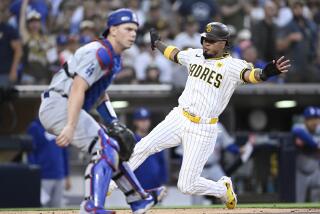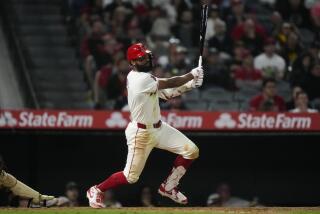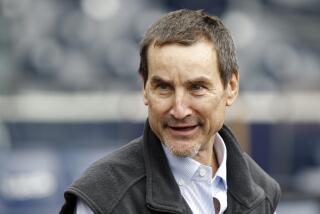PADRES : Monday Finds It Hard to Go Home Again
- Share via
TEMPE, Ariz. — Rick Monday, proudly wearing his Arizona State sweat shirt, strolled through campus and to the Packard Stadium gate Monday morning to prepare for his broadcasting duties.
“Hello, gentlemen,” said Monday, carrying an oversized briefcase. “How are you doing?”
Monday proceeded to walk past the security guards, but was stopped. Sorry, the guard told him, but he needed a pass.
“I don’t have one with me,” Monday said. “I’m Rick Monday, and I’m with the Padres broadcasting team.”
Security guard: “Sorry sir, we can’t let you in.”
Monday, starting to become agitated at this point, said: “Listen, if you want to see my name, come out to the outfield wall with me.”
Hanging along the outfield fence, along with the names of 10 other Arizona State All-American baseball players, was the name of Rick Monday.
“The security guard turned beet-red when he found out who I was,” Monday said. “I said, ‘Hey, you’re only doing your job.’ But you could tell he was awfully embarrassed.”
Monday, the first player chosen when the draft originated in 1965, remains a folk hero around these parts. Even in a university that has produced the likes of Reggie Jackson, Sal Bando, Hubie Brooks, Alvin Davis, Barry Bonds, Bob Horner, Floyd Bannister and Ken Landreaux, Monday’s name still has a special aura.
“You can ask anyone on campus,” said Padre second baseman Marty Barrett, an ASU alumnus, “and they can tell you all about Rick Monday. He’s a legend around here. It’s almost a thing like, well, if Rick Monday went to school here, this is where I want to go, too.”
Monday was ASU’s first All-America baseball player in 1965, along with being selected the NCAA’s Player of the Year. He and Bando led the Sun Devils to their first College World Series championship in 1965, launching a career that spanned 18 seasons in the big leagues.
He played in five league championship series, three World Series and two All-Star Games. He achieved national acclaim when he ran into left field at Dodger Stadium to stop protesters from buring the American flag.
And yet . . .
“The memories here are ones I’ll never forget,” he said. “I remember driving with my mom and uncle from Santa Monica to go to school here. I see a sign that says, ‘Arizona State.’ I said, ‘Oh, my God, why do they have barb wire on top of the fences?’ It turned out to be the Arizona State (Mental) Hospital.
“I go to my dorm room, check in, and find out that they call the place, ‘Animal Farm.” Well, I had Charlie Taylor and Tony Lorcic on one side of me. On the other, I had Jerry Smith and Joe McDonald. Those guys turned out to be some kind of football players. I found out the first weekend that they could party, too. . . .
“If it wasn’t for Bobby Winkles (former ASU coach), I don’t know it any of this would have been possible. He was the one who offered me a scholarship on a recommendation made by Tommy Lasorda. And he was the one who always cared about my well-being, long after I left the university.
“There’s a special feeling I get every time I walk in here.
“I just never knew it would be so hard to walk in.”
Padre pitcher Greg Harris was fidgety the entire morning Monday. He was pacing along the bullpen. He was taking a glance at the scoreboard clock every five minutes. He was a nervous wreck.
“The anticipation was just killing me,” he said.
It hardly was worth the wait. Harris lasted only 1 1/3 innings against the Angels, yielding four hits and six earned runs en route to a 9-4 defeat. Perhaps moving from the bullpen into the starting rotation won’t be quite as easy as Harris imagined.
“I’m going to start talking to some of the starters to see how they prepare,” Harris said, “because I was a wreck. I was always Ball 1. Ball 2. Ball 3. Goodness gracious, Cy Young couldn’t pitch like that.
“It’s a total different mind-set. As a bullpen guy, you’re so used to getting out of crucial situations. As a starter, you’re trying not to get in them.
“The only good thing I can say about today is that it’s over.”
Although Harris still is disturbed the way he was used last season, appearing in a career-high 73 games, eventually developing a sore elbow, he did not blame his performance on possible repercussions of a year ago.
“My arm’s OK,” Harris said, “I just got to get my head straightened out.”
Dick Williams trashed them soon after he was fired. He trashed them in his book. And now, here he was Monday afternoon, working for the Padres once again in his first scouting assignment.
“I wouldn’t have been back if Jack McKeon was still there,” Williams said, “but now the slate’s clean. We’re starting over. And I think I’m going to love it.”
Williams’ primary responsibility will be scouting the American League teams in spring training, and scouting Pacific Coast League games in Las Vegas where he lives. He also is expected to be keeping a close eye on Jim Riggleman, the Padres’ triple-A manager.
“Joe really likes this guy,” Williams said. “He’s going to be a good one. I know he could be on any coaching staff right now, but he wants to manage.
“He’ll get his opportunity, but Joe wants to get acquainted with (Padre Manager Greg) Riddoch, too.”
Padre Notes
The streak is over. Padre outfielder Tony Gwynn, who had not made an out in seven plate appearances, lined out to third base in his first at-bat Monday against Mark Langston. Gwynn wound up going zero for three, and still has not been able to obtain a hit off Langston in 10 years. . . . Outfielder Jim Vatcher continues to impress, hitting a 400-foot home run over the right-center field fence. . . . Padre infielder Joey Cora has been diagnosed with inflammation of his right Achilles’ tendon, and is expected to be out for a few days. . . . Outfielders Jerald Clark and Shawn Abner remain sidelined with strained hamstrings. . . . The Padres will play their first National League team today when they face the San Francisco Giants at 12:05 p.m. (PST).
More to Read
Go beyond the scoreboard
Get the latest on L.A.'s teams in the daily Sports Report newsletter.
You may occasionally receive promotional content from the Los Angeles Times.










